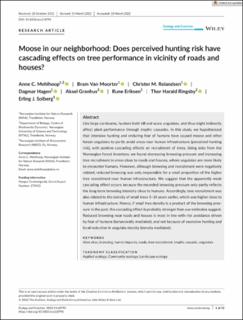| dc.contributor.author | Mehlhoop, Anne Catriona | |
| dc.contributor.author | Van Moorter, Bram | |
| dc.contributor.author | Rolandsen, Christer Moe | |
| dc.contributor.author | Hagen, Dagmar | |
| dc.contributor.author | Granhus, Aksel | |
| dc.contributor.author | Eriksen, Rune | |
| dc.contributor.author | Ringsby, Thor Harald | |
| dc.contributor.author | Solberg, Erling Johan | |
| dc.date.accessioned | 2022-07-08T07:47:14Z | |
| dc.date.available | 2022-07-08T07:47:14Z | |
| dc.date.created | 2022-05-10T10:29:13Z | |
| dc.date.issued | 2022-04-03 | |
| dc.identifier.citation | Mehlhoop, A. C., Van Moorter, B., Rolandsen, C. M., Hagen, D., Granhus, A., Eriksen, R., Ringsby, T. H., & Solberg, E. J. (2022). Moose in our neighborhood: Does perceived hunting risk have cascading effects on tree performance in vicinity of roads and houses? Ecology and Evolution, 12(4). Portico. | en_US |
| dc.identifier.issn | 2045-7758 | |
| dc.identifier.uri | https://hdl.handle.net/11250/3003761 | |
| dc.description.abstract | Like large carnivores, hunters both kill and scare ungulates, and thus might indirectly affect plant performance through trophic cascades. In this study, we hypothesized that intensive hunting and enduring fear of humans have caused moose and other forest ungulates to partly avoid areas near human infrastructure (perceived hunting risk), with positive cascading effects on recruitment of trees. Using data from the Norwegian forest inventory, we found decreasing browsing pressure and increasing tree recruitment in areas close to roads and houses, where ungulates are more likely to encounter humans. However, although browsing and recruitment were negatively related, reduced browsing was only responsible for a small proportion of the higher tree recruitment near human infrastructure. We suggest that the apparently weak cascading effect occurs because the recorded browsing pressure only partly reflects the long-term browsing intensity close to humans. Accordingly, tree recruitment was also related to the density of small trees 5–10 years earlier, which was higher close to human infrastructure. Hence, if small tree density is a product of the browsing pressure in the past, the cascading effect is probably stronger than our estimates suggest. Reduced browsing near roads and houses is most in line with risk avoidance driven by fear of humans (behaviorally mediated), and not because of excessive hunting and local reduction in ungulate density (density mediated). Alces alces, browsing, human impacts, roads, tree recruitment, trophic cascade, ungulates Applied ecology; Community ecology; Landscape ecology | en_US |
| dc.language.iso | eng | en_US |
| dc.publisher | John Wiley & Sons Ltd. | en_US |
| dc.rights | Navngivelse 4.0 Internasjonal | * |
| dc.rights.uri | http://creativecommons.org/licenses/by/4.0/deed.no | * |
| dc.title | Moose in our neighborhood: Does perceived hunting risk have cascading effects on tree performance in vicinity of roads and houses? | en_US |
| dc.title.alternative | Moose in our neighborhood: Does perceived hunting risk have cascading effects on tree performance in vicinity of roads and houses? | en_US |
| dc.type | Peer reviewed | en_US |
| dc.type | Journal article | en_US |
| dc.description.version | publishedVersion | en_US |
| dc.rights.holder | © 2022 The Authors | en_US |
| dc.subject.nsi | VDP::Zoologiske og botaniske fag: 480 | en_US |
| dc.subject.nsi | VDP::Zoology and botany: 480 | en_US |
| dc.source.volume | 12 | en_US |
| dc.source.journal | Ecology and Evolution | en_US |
| dc.source.issue | 4 | en_US |
| dc.identifier.doi | 10.1002/ece3.8795 | |
| dc.identifier.cristin | 2022968 | |
| dc.relation.project | Norges forskningsråd: 272413 | en_US |
| dc.source.articlenumber | e8795 | en_US |
| cristin.ispublished | true | |
| cristin.fulltext | original | |
| cristin.qualitycode | 1 | |

